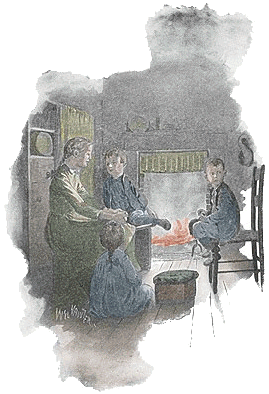The Start of Horror
It’s that time of year again, when Halloween approaches and even normal people find themselves thinking about ghosts and goblins and maybe even watching a horror movie. (This is as opposed to people like me – and if you’re reading this, likely people like you too – who think about, read about, and write about things like this all year round, and are as likely to watch a horror film in April as we are in October.)
But at this time of year I want to take a moment to pay tribute to a writer whose efforts at horror poetry had an impact on my childhood that I remember to this day. No, I don’t mean Poe, or Lovecraft, or Bierce, or any of the others who likely spring to mind for you. I read this man’s words before I ever read any of those others, partially because the poem I encountered was intended for children.
I’m talking about James Whitcomb Riley, and his poem “Little Orphant Annie.”
- LITTLE Orphant Annie’s come to our house to stay,
- An’ wash the cups an’ saucers up, an’ brush the crumbs away,
- An’ shoo the chickens off the porch, an’ dust the hearth, an’ sweep,
- An’ make the fire, an’ bake the bread, an’ earn her board-an’-keep;
- An’ all us other childern, when the supper-things is done,
- We set around the kitchen fire an’ has the mostest fun
- A-list’nin’ to the witch-tales ‘at Annie tells about,
- An’ the Gobble-uns ‘at gits you
- Ef you
- Don’t
- Watch
- Out!
- Wunst they wuz a little boy wouldn’t say his prayers,–
- An’ when he went to bed at night, away up-stairs,
- His Mammy heerd him holler, an’ his Daddy heerd him bawl,
- An’ when they turn’t the kivvers down, he wuzn’t there at all!
- An’ they seeked him in the rafter-room, an’ cubby-hole, an’ press,
- An’ seeked him up the chimbly-flue, an’ ever’-wheres, I guess;
- But all they ever found wuz thist his pants an’ roundabout:–
- An’ the Gobble-uns ‘ll git you
- Ef you
- Don’t
- Watch
- Out!
- An’ one time a little girl ‘ud allus laugh an’ grin,
- An’ make fun of ever’ one, an’ all her blood-an’-kin;
- An’ wunst, when they was “company,” an’ ole folks wuz there,
- She mocked ’em an’ shocked ’em, an’ said she didn’t care!
- An’ thist as she kicked her heels, an’ turn’t to run an’ hide,
- They wuz two great big Black Things a-standin’ by her side,
- An’ they snatched her through the ceilin’ ‘fore she knowed what she’s about!
- An’ the Gobble-uns ‘ll git you
- Ef you
- Don’t
- Watch
- Out!
- An’ little Orphant Annie says, when the blaze is blue,
- An’ the lamp-wick sputters, an’ the wind goes woo-oo!
- An’ you hear the crickets quit, an’ the moon is gray,
- An’ the lightnin’-bugs in dew is all squenched away,–
- You better mind yer parunts, an’ yer teachurs fond an’ dear,
- An’ churish them ‘at loves you, an’ dry the orphant’s tear,
- An’ he’p the pore an’ needy ones ‘at clusters all about,
- Er the Gobble-uns ‘ll git you
- Ef you
- Don’t
- Watch
- Out!
Sure, as an adult I can see how obviously it’s a morality piece. But as a six-year-old sitting in my grade school library* I came away with only those final words from each verse: “the gobble-uns’ll git you ef you don’t watch out.” These weren’t the goblins from The Hobbit, however much my brother insisted otherwise. I was sure I knew better. These gobble-uns were different. They were from this world. They hid in shadows and cracks and came out on moonlit nights.
I imagined details well beyond what was in the poem, but children add their own backstory. I felt like I knew those hideous little creatures, that maybe I’d seen them. And from childhood moments like that, my love of horror was born.
For those of you who love horror, how did it start for you?
*My grade school library rocked. I read about vampire and werewolf folklore there, and short stories such as Robert Louis Stevenson’s “The Bottle Imp.”


